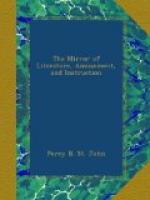J.G.B.
* * * * *
ORIGIN OF THE PINE CALLED WHITE-HART SILVER.
Blackmoor Forest, at the spring of the Froome, was once called the Forest of White Hart, and at that time the seat of royalty, and greatly preferred by our kings, on account of the deer with which it abounded. King Henry III., with a mighty train of hunters, having one day entered on the chase in this neighbourhood, roused a milk-white hart. The creature afforded his Majesty so much sport, that at the pulling down, it was the royal pleasure to save the beast, and place round his neck a collar of brass, on which was engraved,
“I am a royal hart, let no one harm me.”
But the king and his retinue having run over and spoiled the lands of a gentleman of the county, named Thomas de la Linde, and refusing, upon remonstrance, to make good the injury, De la Linde imprudently resolved to spite King Henry; when, joining with others, he hunted the white hart, and having run it down, foolishly took the life of the king’s favourite; and making merry over its haunches, was heard in his cups to utter many disrespectful speeches towards his sovereign, which were conveyed to Henry, who presently convinced De la Linde of his presumption, and so highly resented the indignity, that he made every one concerned in the death of the noble animal pay into his exchequer an annual fine, called “White Hart Silver,” which was not remitted during the reign of that monarch. This is also the origin of the White Hart for a sign at the different inns and houses of entertainment throughout England.
J.G.B.
* * * * *
WHITSUNTIDE IN GLOUCESTERSHIRE.
One of the most strange customs which time has handed down to us, prevails at St. Briavel’s, in Gloucestershire. On Whit Sunday, several baskets full of bread and cheese, cut into small squares of about an inch each, are brought into the church; and immediately after divine service is ended, the churchwardens, or some other persons, take them into the galleries, from whence their contents are thrown amongst the congregation, who have a grand scramble for it in the body of the church, which occasions as great a tumult and uproar as the amusement of a village wake, the inhabitants being always extremely anxious in their attendance at worship on this day.
This custom is held for the purpose of preserving to the poor of St. Briavel’s and Hewelfield, the right of cutting and carrying away wood from three thousand acres of coppice land, in Hudknolls and the Meends; and for which every housekeeper is assessed twopence, to buy the bread and cheese given away.
J.G.B.
* * * * *




